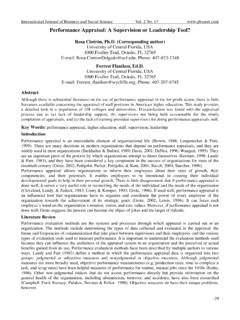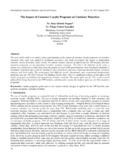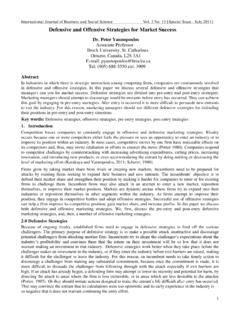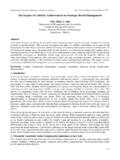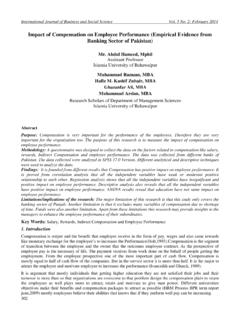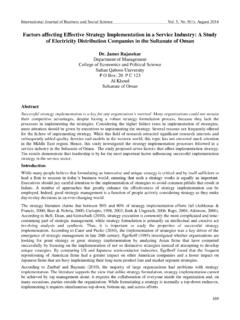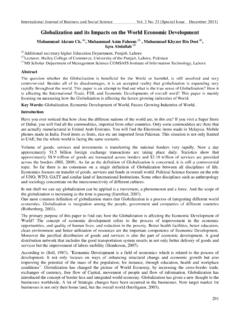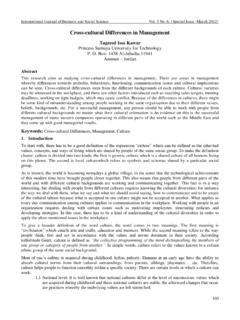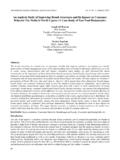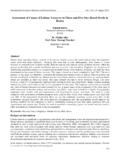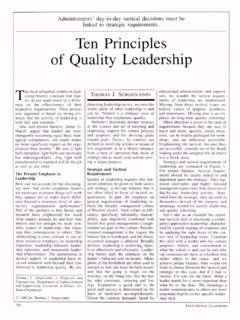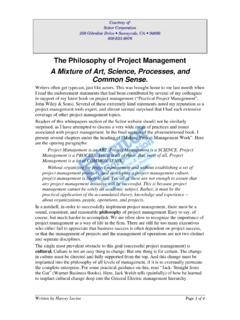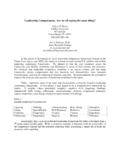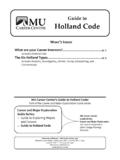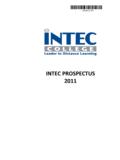Transcription of Leadership Styles: The Power to Influence Others
1 International Journal of Business and Social Science Vol. 4 No. 4; April 2013 1 Leadership styles : The Power to Influence Others Marcus Goncalves, EdD Associate Professor of Management International Business Program Chair Nichols College 124 Center Rd, Dudley, MA 01571, USA. Abstract This paper is an attempt to briefly explain the various techniques of gaining Power in an organization, and how one would use these powers (or not) when managing organizational behavior.
2 Oftentimes, the Leadership of a corporation is in jeopardy when little attention is given to how Power is deployed. Moreover, this paper discusses how the Leadership process itself can become a monologue when divorced from the mission of the organization, its people and the culture it permeates. It suggests that the unsuccessful corporate leader will remain ineffective, despite advanced degrees, as long as the art and the science of influencing people continue to be taught and studied in a historic vacuum.
3 Keywords: Leadership , organizational behavior, management Power , Introduction This research paper has two main objectives: first, it is an attempt to briefly explain the various techniques of gaining Power in an organization, and how one would use these powers (or not) when managing organizational behavior. Oftentimes, the Leadership of a corporation is in jeopardy when little attention is given to how Power , or the ability to Influence subordinates and peers (Montana & Charnov, 2000, ) is used.
4 The Leadership process itself can become a monologue when divorced from the mission of the organization, its people and the culture it permeates. The unsuccessful corporate leader will remain ineffective, despite advanced degrees, so long as the art and the science of influencing people continue to be taught in a historic vacuum. That is why recently, as market demands increase, there has been a push for mastery in management and organizational behavior degrees at leading universities and colleges in the United States and the world.
5 The use of Power in organizations during the agricultural era (or wave, as Toffler would probably have phrased in his book The Third Wave) must have been significantly different after the industrial revolution. Not only had the working environment changed dramatically, but the people, particularly professionals, had changed as well. They were coping with inexorable transformations as they fled the farms and flocked to the mills and industrial parks. Hence, under a historic context, what are the main Power techniques available today, not for the information age of the latter part of the last century, but rather for the knowledge economy that characterizes this new century?
6 What are the most successful forms of Power to be adopted? This paper attempts to address some of these issues, although it is not intended to be exhaustive; it does not portray the history in all varieties of individual organizational powers within an organizational setting, orproclaim the best form of Power to be adopted in any given organization. It does, however, provide a bit of each, as it strives to provide an overview of the types of individual powers while suggesting certain forms of powers necessary to lead what Rolf Jensen (1999, ) called the dream society.
7 Leadership styles : the Power to Influence Others Leadership within organizations is only attainable through the combination and use of Power and authority. As discussed by John Kotter (1985, ) Power is the ability to Influence Others to get things done, while authority is the formal rights that come to a person who occupies a particular position, since Power does not necessarily accompany a position. Problems always arise when Power is imposed without the backing of authority, which almost invariably is opposed.
8 Centre for Promoting Ideas, USA 2 While too often we can find powerful people who do not hold genuine positions of authority, we frequently find people whoare in a position of authority, but are powerless to Influence the behavior of Others . Leadership can be learned, and Power can be developed, but in order to be an effective leader,one must be able to distinguish from the various forms of Power and select the one most in line with his or herleadership style, character traits and working environment.
9 There are seven types of management powers, which can be used separately or in combination. The most successful leaders are capable of using most, if not all of these, simultaneously. While Others less fortunate find themselves stagnated with limitations they must overcome. It is worth noting that the most common description of Power is French and Raven s, dated back to 1960, which includes the first five forms of Power listed below. The seven types of management powers are: Legitimate, Expert, Coercive, Reward, Referent, Charisma and Information.
10 Legitimate Power refers to the authority of a formal position, and stems from the concept of ownership rights. Although plethora of leaders believe that their Power augments as they are promoted through the ranks, without personal Power , legitimate or position Power has its limitations, as their Power can become diluted. Expert Power does not rely on formal positions, as it originates from people who possess technical information, or specific skills and expertise respected by Others . These professionals are typically promoted into managerial positions because they have performed at an outstanding level in their technical functions.
